#Carl_Sagan #testifying before #Congress in #1985 on #climate_change
Unbelievable, isn't it? #1985! But look for yourself!
Carl's speak
2 Likes
Unbelievable, isn't it? #1985! But look for yourself!
The Guardian
Anonymous street artist Foka Wolf uses the language of advertising to highlight political and social issues, from the PPE crisis to food banks. “I grew up in a low income, single-parent household,” he says, “so I take it very fucking personally when people in power try and demonise those who are broke and voiceless.” Known as the Birmingham Banksy (“I prefer Poundland Banksy”), Wolf has fooled countless people with his fake billboards. “There’s a lot of power in putting words on paper. One poster was offering students money to grow 23 pairs of ears on their back and quite a few people were up for it.” During tough political times, does it get harder to make satire? “Easier. More dickheads – more targets.” (...)
Tags: #art #street_art #protest #advertising #social_issues #food_banks #climate #climate_change #climate_crisis #social_services #inequality #poverty
The Guardian
Global concentrations of carbon dioxide, methane and nitrous oxide climbed to unseen levels in 2023, underlining climate crisis.
The levels of the three most important heat-trapping gases in the atmosphere reached new record highs again last year, US scientists have confirmed, underlining the escalating challenge posed by the climate crisis.
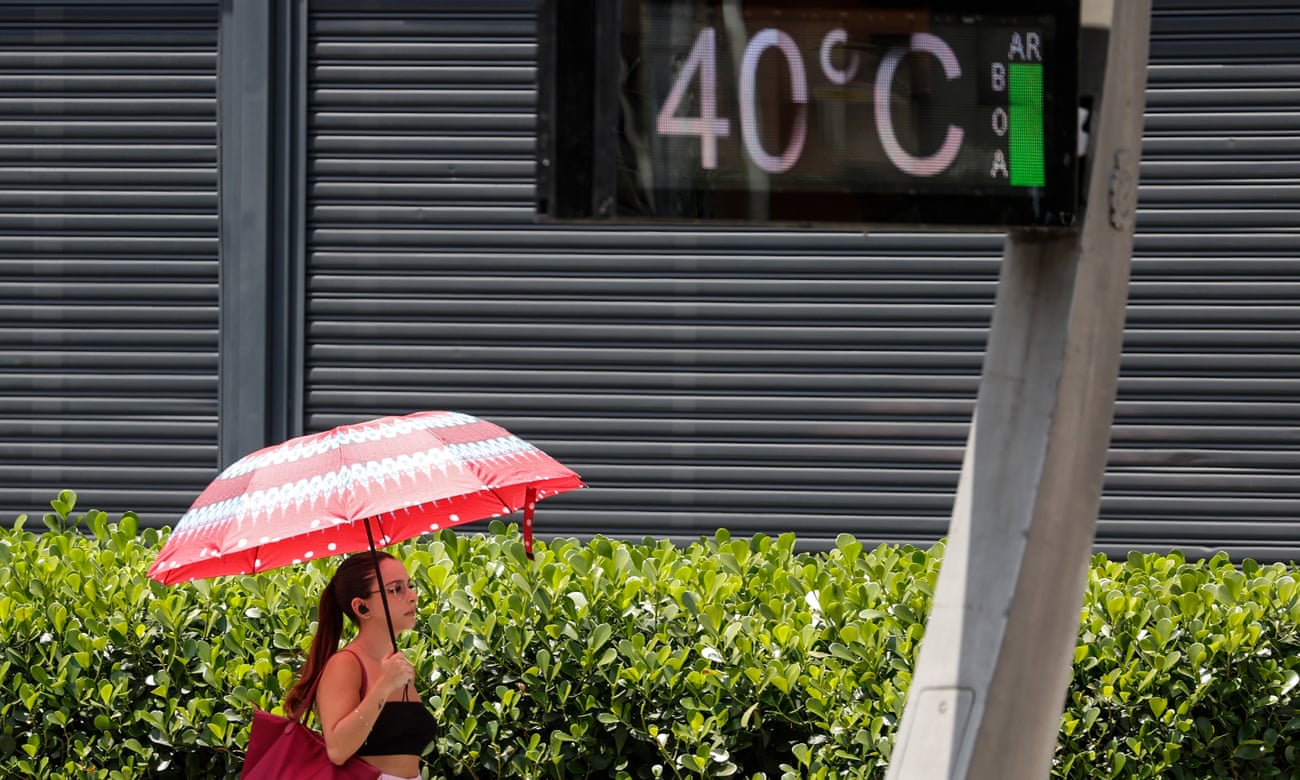
A young woman protects herself from the sun in São Paulo, Brazil, on 14 November 2023. Photograph: Sebastião Moreira/EPA.
Tags: #climate #climate_change #climate_crisis #global_warming #antarctic #greenhouse_gas
The Guardian
An unprecedented leap of 38.5C in the coldest place on Earth is a harbinger of a disaster for humans and the local ecosystem.
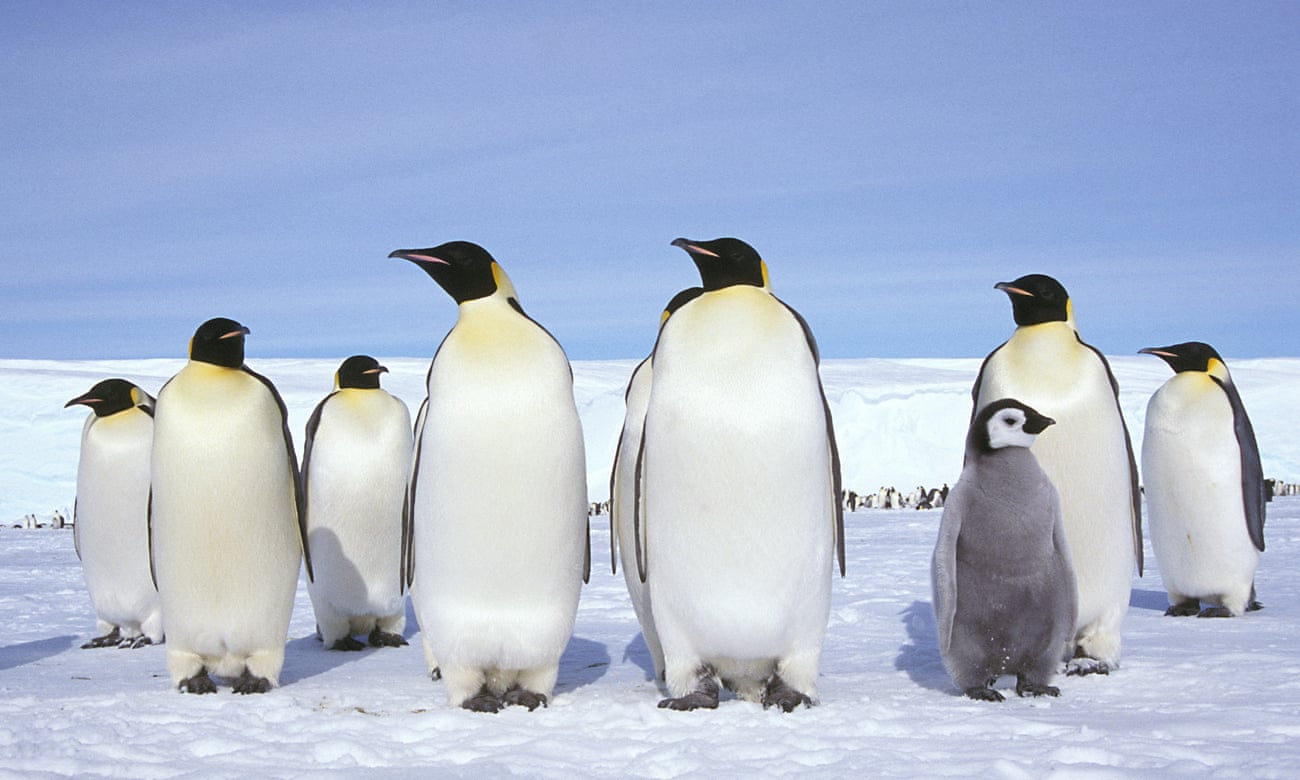
Thousands of emperor penguin chicks drowned last year when the sea-ice broke up before they could fully fledge. Photograph: Fritz Polking/Gamma-Rapho/Getty Images.
Tags: #climate #climate_change #climate_crisis #global_warming #antarctic #greenhouse_gas
The Guardian
On a planet getting hotter and drier by the year, governments are wilfully ignoring a looming crisis. (...)
(Text continues underneath the photo.)
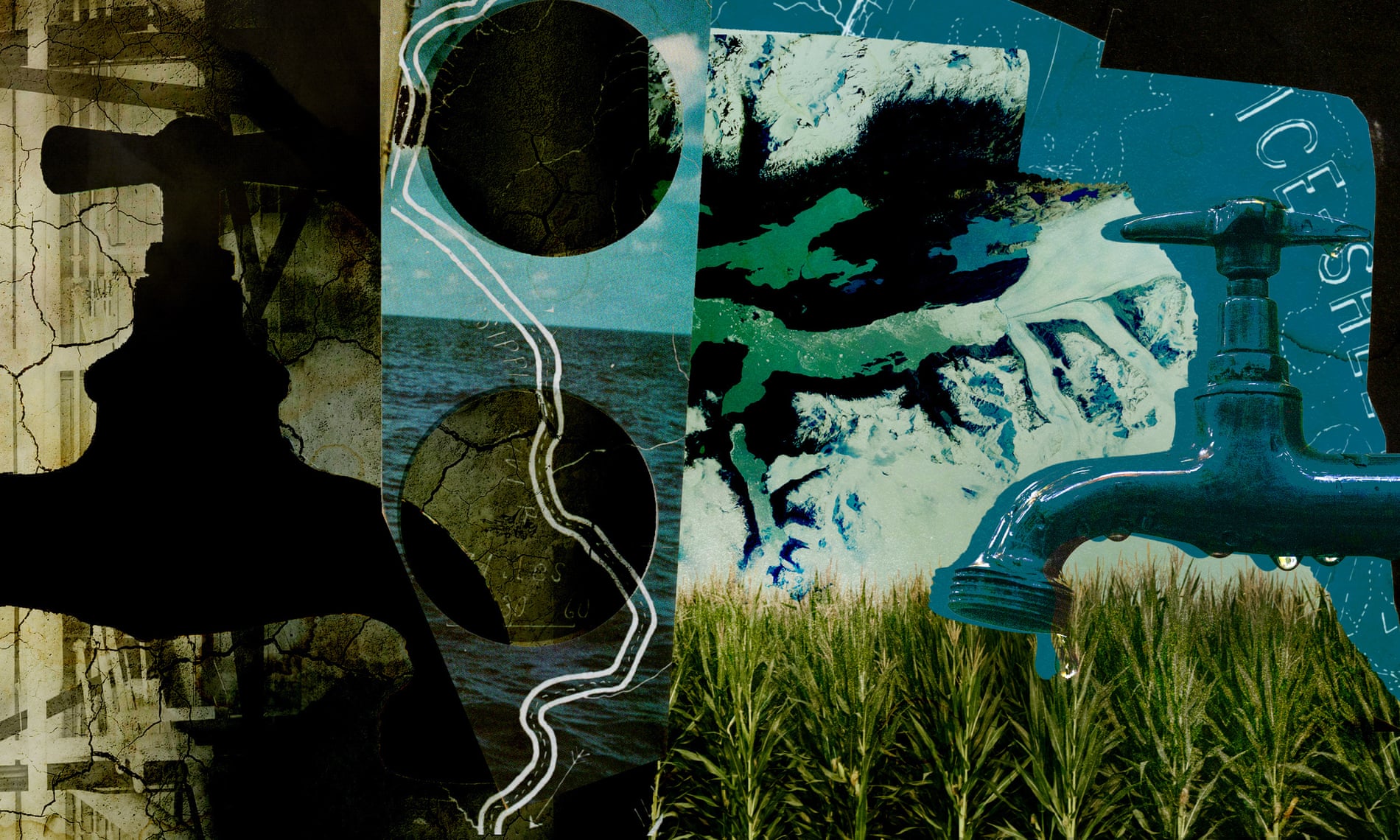
Illustration: Eleanor Shakespeare/The Guardian
To keep pace with the global demand for food, crop production needs to grow by at least 50% by 2050. (...)
A paper published in 2017 estimated that to match crop production to expected demand, water use for irrigation would have to increase by 146% by the middle of this century. One minor problem. Water is already maxed out.
In general, the dry parts of the world are becoming drier, partly through reduced rainfall; partly through declining river flow as mountain ice and snow retreats; and partly through rising temperatures causing increased evaporation and increased transpiration by plants. (...)
Already, agriculture accounts for 90% of the world’s freshwater use. We have pumped so much out of the ground that we’ve changed the Earth’s spin. The water required to meet growing food demand simply does not exist.
That 2017 paper should have sent everyone scrambling. But as usual, it was ignored by policymakers and the media. (...)
Above all, we need to change our diets. Those of us with dietary choice (in other words, the richer half of the world’s population) should seek to minimise the water footprint of our food. With apologies for harping on about it, this is yet another reason to switch to an animal-free diet, which reduces both total crop demand and, in most cases, water use. (...)
This is yet another of those massive neglected issues, any one of which could be fatal to peace and prosperity on a habitable planet. Somehow, we need to recover our focus.
Tags: #agriculture #water #water_use #crops #irrigation #cattle_farming #food_production #drought #rainfall #climate_change #climate_crisis #global_warming
The Guardian
Ukraine needs more help, the far right is on the rise and the Middle East crisis gets worse. Where is the European Union’s vision? (...)
(Tekst loopt door onder de foto.)
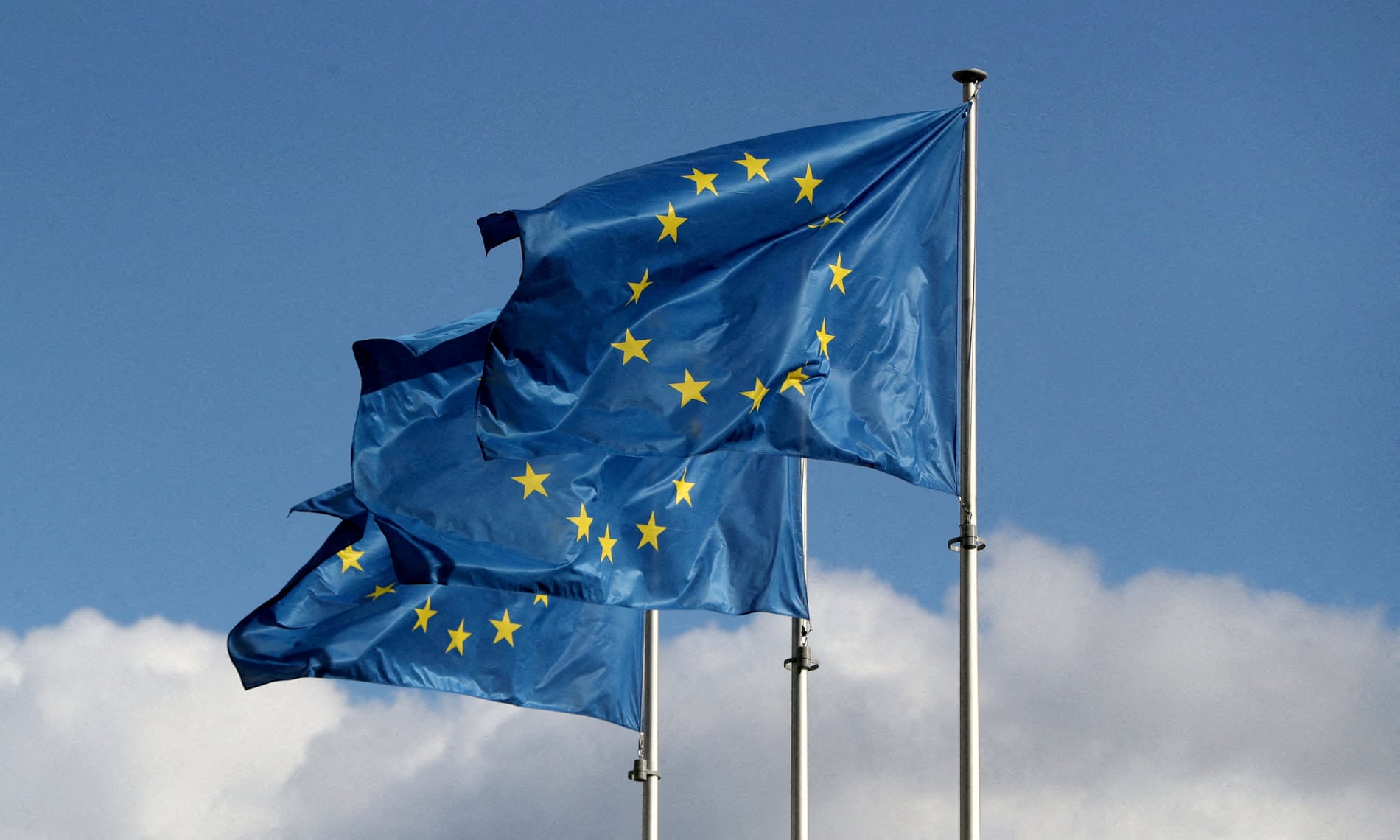
European Union flags fly outside the EU Commission headquarters in Brussels. Photograph: Yves Herman/Reuters.
The way it’s going, 2024 could turn into a nightmare for the 27-country bloc – an all-time annus horribilis. A daunting slew of international and internal challenges is coming to a head. Is the EU ready to meet them? Definitely not.
Take the crisis in the Red Sea. Iran-backed Houthi militants have been attacking shipping there since the Israel-Hamas war began. (...)
The EU has an important stake in this fight. About 40% of its Asia and Middle East trade moves via Suez. But only the Netherlands provided hands-on assistance. (...)
Snoozing at the tiller, Europe is again failing to pair its self-interest and aspirations as a global actor with timely, concrete, joined-up action.
The Gaza war has exploded another illusion ahead of this week’s pivotal EU summit. (...) As Israel’s largest trading partner, they think the EU has leverage. All support a two-state solution. But when Josep Borrell, EU foreign policy chief, outlined a 10-point peace plan for Palestine last week, his VIP guest, Israel Katz, Israel’s foreign minister, ignored it. (...)
Europe’s bottomless capacity for punching below its weight is damaging Ukraine, where two years on from its invasion, Russia appears to be slowly gaining the upper hand. (...)
The failure of some EU countries, notably France, to supply more and better arms, as US deliveries dry up, is also harming Ukraine’s chances – and consequentially, Europe’s hopes of defending its borders from future Russian aggression. That’s especially pertinent given Trump’s prospective return to the White House a year from now. (...)
Trump’s resurrection “would endanger European interests but Europe is not investing in mitigating the risks.” (...)
[T]he geopolitical dangers facing the EU in 2024 are global – and exacerbated by the dithering of its wealthiest member. Germany’s chancellor, Olaf Scholz, “is giving no political or strategic leadership to a Europe that is ill-prepared for a possible rupture of the transatlantic relationship.” (...)
“Similarly, neither Germany nor Europe is prepared to withstand the growing influence of regimes that challenge the traditional prominence of the west” – a reference to China, a big trade partner and bigger potential threat. (...)
Germany is also a flashpoint in the main internal political challenge confronting the EU – the rise of the far right. (...)
New polling by the European Council on Foreign Relations suggests populist “anti-European” parties, principally of the right, will make large gains in EU and national elections this year. Migration, broken budgets, energy and climate are other explosive common denominator issues. (...)
Can the EU survive a dangerous, defining year? It will probably muddle through. But the sort of strategic leadership and vision offered by Jacques Delors, the legendary Eurocrat who died last month, is evidently lacking – and urgently required. (...)
Tags: #europa #european_union #gaza #israel #palestine #palestinians #houthi #red_sea #germany #france #china #ukraine #russia #putin #far_right #migration #climate #climate_crisis #climate_change #trump #nato #borrell
The Crucial Years
The world—its politics, its economy, and its journalism—has trouble coping with the scale of the climate crisis. We can’t quite wrap our collective head around it, which has never been clearer to me than in these waning days of 2023.
Because the most important thing that happened this year was the heat. (...)
And yet you really wouldn’t know it from reading the wrap-ups of the year’s news now appearing on one website after another. (...)
Those stories in the Times and Post were a way to search for a new angle to a story that doesn’t change quite fast enough to count as news. (In geological terms, we’re warming at hellish pace; but that’s not how the 24/7 news cycle works.) (...) We’re programmed—by evolution, doubtless, and in the case of journalism by counting clicks—to look for novelty and for conflict. Climate change seems inexorable, which is the opposite of how we think about news.
The war in Gaza, by contrast, fits our defintions perfectly. (...) But in a sense, it is the very familiarity of the war that makes it easy for us to focus on it; “mideast conflict,” like “inflation” or “presidential elections,” is an easily-accessed template in our minds. (...) Next year seems likely to be another orgy of familiarity: Joe Biden and Donald Trump, yet again. (...)
[W]e’re literally in uncharted territory, dealing with temperatures no human society has ever dealt with before. And to head off the worst, we are going to require an industrial transition on a scale we’ve never seen before: there were signs this year that that transition has begun (by midsummer we were installing a gigawatt worth of solar panels a day) but it will have to go much much faster.
These changes—the physical ones, and the political and economic ones—are almost inconceivable to us. That’s my point; they don’t fit our easy templates. (...)
"The only really important question is, 'How many more years like this we have to have before the reality of how bad climate change is breaks into the public's consciousness?'" (...)
Tags: #climate #climate_change #climate_crisis #heatwaves #extreme_weather #flooding #fossil_fuel #co2 #media #news #news_cycle #journalist #journalism
the Guardian
Disastrous events included flash flooding in Africa and wildfires in Europe and North America. (...)
“When our children and grandchildren look back at the history of human-made climate change, this year and next will be seen as the turning point at which the futility of governments in dealing with climate change was finally exposed,” he said. “Not only did governments fail to stem global warming, the rate of global warming actually accelerated.” (...)
(Text continues underneath the photo.)
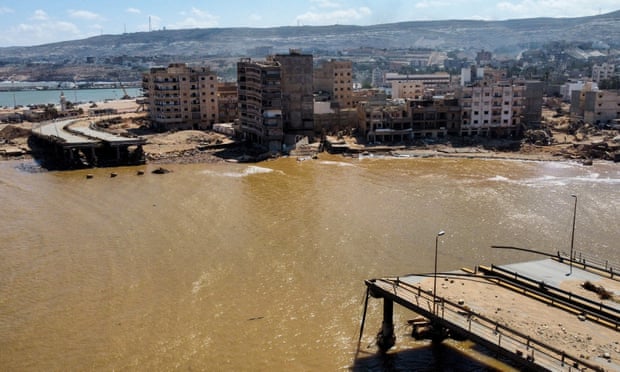
Flash floods in the Libyan city of Derna were the most deadly climate disaster of 2023, killing 11,300 people. Photograph: Mahmud Turkia/AFP/Getty Images.
“The bright side of this clear dichotomy is that young people may realise that they must take charge of their future. The turbulent status of today’s politics may provide opportunity,” he said.
His comments are a reflection of the dismay among experts at the enormous gulf between scientific warnings and political action. It has taken almost 30 years for world leaders to acknowledge that fossil fuels are to blame for the climate crisis, yet this year’s United Nations Cop28 summit in Dubai ended with a limp and vague call for a “transition away” from them, even as evidence grows that the world is already heating to dangerous levels. (...)
Veteran climate watchers have been horrified at the pace of change. “The climate year 2023 is nothing but shocking, in terms of the strength of climate occurrences, from heatwaves, droughts, floods and fires, to rate of ice melt and temperature anomalies particularly in the ocean,” Prof Johan Rockström, the joint director of the Potsdam Institute for Climate Impact Research in Germany, said.
He said these new developments indicated the Earth was in uncharted territory and under siege. (...)
[W]hat disturbed him most in 2023 was the sharp increase in sea surface temperatures, which have been abrupt even for an El Niño year. (...)
In the Antarctic, scientists have also been perplexed and worried by the pace of change. (...)
[H]uman influence – through the burning of fossil fuels – had also created “frightening” dynamics between the poles and the tropics. Cold wet fronts from the Antarctic had interacted with record heat and drought in the Amazon to create unprecedented storms in between. (...)
This year’s deadliest climate disaster was the flood in Libya that killed more than 11,300 people in the coastal city of Derna. In a single day, Storm Daniel unleashed 200 times as much rain as usually falls on the city in the entire month of September. (...)
Forest fires burned a record area in Canada and Europe, and killed about 100 people in Lahaina on Maui island, the deadliest wildfire in US history, which happened in August. (...)
Tags: #climate #climate_change #climate_crisis #energy #energy_transition #carbon_footprint #global_warming #fossil_fuel #extreme_weather #storms #floodings #flash_floods #forest_fires #wildfires #heat_waves #cop28
The Guardian
Amid all the hysteria about ChatGPT and co, one thing is being missed: how energy-intensive the technology is. (...)
Given the current hysteria about AI, I thought I’d check to see where it is on the chart [of the Gartner Hype Cycle]. (...)
(Text continues underneath the photo.)

The carbon footprint of server farms used to power generative AI could be problematic. Photograph: Bloomberg/Getty Images.
All of this serves the useful function – for the tech industry, at least – of diverting attention from the downsides of the technology that we are already experiencing: bias, inscrutability, unaccountability and its tendency to “hallucinate”, to name just four. (...) Which is worrying because its environmental impact will, at best, be significant and, at worst, could be really problematic.
How come? Basically, because AI requires staggering amounts of computing power. And since computers require electricity, and the necessary GPUs (graphics processing units) run very hot (and therefore need cooling), the technology consumes electricity at a colossal rate. (...)
So maybe the best hope for the planet would be for generative AI to topple down the slippery slope into Gartner’s “trough of disillusionment”, enabling the rest of us to get on with life.
Tags: #artificial_intelligence #ai #chatgtp #computing #energy #energy_transition #carbon_footprint #climate #climate_change #climate_crisis #global_warming
The Guardian
With some exceptions, the news industry is still not responding to the true scale and danger of global heating. (...)
Despite our living through the hottest summer in history, as well as wildfires, tropical storms and crazy-hot oceans, the news media continues to be outdone by the rest of popular culture when it comes to covering the most urgent story of our time.
(text continues underneath the picture.)
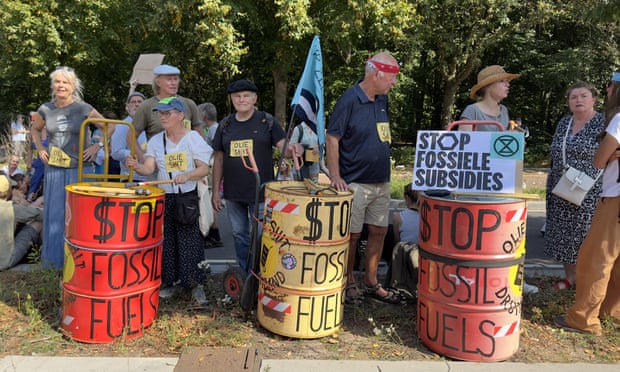
‘With the planet on fire, more and better news coverage is itself an essential climate solution.’ Photograph: Anadolu Agency/Getty Images.
Inexplicably, climate crisis remains a niche concern for most mainstream news outlets. In the US, most TV coverage of this summer’s hellish weather did not even mention the words “climate change” or “climate crisis”, much less explain that the burning of oil, gas and coal is what’s driving that hellish weather. Too many newsrooms continue to see climate as a siloed beat of specialists. (...)
Dramatic changes in climate have made increased news coverage of extreme weather unavoidable. But explaining the climate connection to extreme weather is a different task. Linking changes in the weather to the decisions being made by industry and government, that have overheated the planet is where news coverage needs to end up. (...)
In every newsroom in every community, climate crisis needs to be thought of not as a beat, but as a through-line involving everything we do. No corner of the newsroom is exempt – not business or culture, not sports or city hall. (...)
Can politics reporters and editors scale back their fixation on horse-race coverage and instead provide the kind of coverage that voters need to make informed choices? Election coverage should help audiences understand what the candidates will do about the climate crisis if elected, not just what they say. It should hold candidates accountable by asking them not (as Fox did at the first US Republican debate last month) whether they believe in climate change but rather, “What is your plan to deal with the climate crisis?”
Overall, we also need much more and better coverage of climate solutions. (...)
What else does “more and better” climate coverage mean? We expect some answers to emerge this week at Climate Changes Everything: Creating a Blueprint for Media Transformation, a conference at the Columbia Journalism School in New York. (...)
With the planet on fire, more and better news coverage is itself an essential climate solution. Only when the general public understands what is happening, why and what needs to be done, can large enough numbers of people compel governments and corporations to change course. (...)
But the news industry as a whole is still not matching the scale of the crisis with the kind of coverage that’s required. (...)
> See also: Climate Collapse – The Grim Silence Of Our Leaders (Media Lens)
Tags: #climate #climate_change #climate_crisis #fossil_fuels #co2 #pollution #air_pollution #global_warming #extreme_weather #forest_fires #flooding #heat_waves #health #climate_deniers #propaganda #fake_news #disinformation #capitalism #industrial_capitalism #media #news #news_media #journalist #journalism #Covering_Climate_Now
The Guardian
Rail networks in most countries have been starved of funding while motorways lengthen, study shows.
(Text continues underneath the photo.)
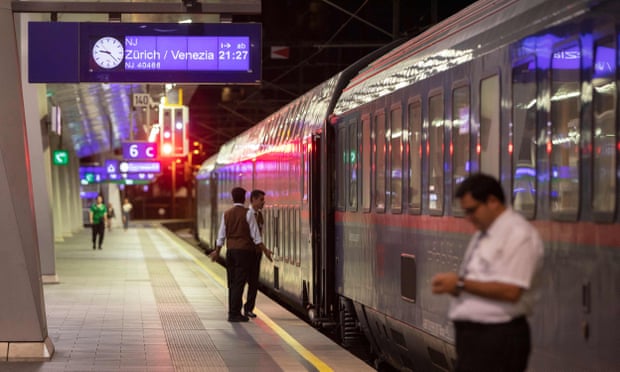
A sleeper train in Vienna. Austria is one of only seven countries in Europe that has invested more in its rail network than on roadbuilding in recent years. Photograph: Alex Halada/AFP/Getty Images.
European governments have “systematically” shrunk their railways and starved them of funding while pouring money into expanding their road network, a report has found.
The length of motorways in Europe grew 60% between 1995 and 2020 while railways shrank 6.5%, according to research from the German thinktanks Wuppertal Institute and T3 Transportation. For every €1 governments spent building railways, they spent €1.6 building roads. (...)
“Most European countries have been actually encouraging car use by investing large amounts of public money into expanding motorway infrastructure.”
In the public and political debate, Mattioli added, small investments into bike lanes and railways were heavily scrutinised while investments in roads were taken for granted. “This absolutely needs to change if we are to meet climate mitigation targets in the transport sector.” (...)
The EU plans to cut its greenhouse gas emissions by 55% by the end of the decade from 1990 levels but has failed to make any headway in its transport sector. Road transport was responsible for three-quarters of the sector’s emissions in 2020. (...)
“The €9 and €49 German tickets have given many the impression that people would shift to public transport if it were cheaper. But levels of service and infrastructure networks are much more important for modal shift. So I think we should be talking less about fares and a lot more about infrastructure.”
Tags: #climate #climate_change #climate_crisis #europe #eu #european_union #transport #cars #public_transport #roads #rail #railways #infrastructure #greenhouse_gas_emissions #greenhouse_gas #air_pollution #pollution
#documentary #limits_to_growth #environmentalism #climate_change
Documentary broadcast in 1971 by Thames Television UK regarding "The Limits To Growth" that kick-started environmentalism and various global agendas.
Media Lens
None of us has previously witnessed a barrage of extreme weather events of the kind that has been devastating lives across the globe this summer. (...)
Almost as astonishing has been the indifference of our leaders. The silence has been deafening. Where are they? Why is no-one joining the dots and demanding some kind of serious response? (...)
(Text conitinues underneath the picture.)
Broadcaster and author Stephen Fry said on the BBC:
‘Extraordinary that you can have a conversation with an economics minister in Labour who didn’t even mention the climate catastrophe coming, that there’s a tsunami coming towards us… yet everyone is talking about just doing the same thing only better. It’s catastrophic.’ (...)
Or compare with NASA climate scientist Peter Kalmus, previously arrested for defending the Earth:
‘Dear journalists of the world: We are at risk of losing basically everything. This – what we’re experiencing now – is how that process unfolds. The more fossil fuels we burn, the further in that process we go.
‘You MUST begin to tell 5 critical truths. Civilization depends on it.’
Despite the overwhelming evidence that climate catastrophe is not just a looming threat, it is here; despite the desperate pleading for help from climate scientists; and despite the surreal silence and indifference of Western political leaders, a stubborn rump of opinion continues to insist that the climate crisis is a cynical scam promoted by vested interests. (...)
It is crucial to look deeper because the reality becomes clear when we ask even the simplest of rational questions:
How does the [media] coverage afforded to climate collapse compare to coverage afforded to other comparable threats?
How much of this coverage recognises the true severity of the threat, its true corporate causes and the business-unfriendly revolution in priorities required if it is to be addressed? (...)
As recently as April 2019, even after the start of the mass climate protests a year earlier, Columbia Journalism Review reported:
‘Yet at a time when civilization is accelerating toward disaster, climate silence continues to reign across the bulk of the US news media. Especially on television, where most Americans still get their news… Many newspapers, too, are failing the climate test. Last October, the scientists of the United Nations’ Intergovernmental Panel on Climate Change (IPCC) released a landmark report, warning that humanity had a mere 12 years to radically slash greenhouse-gas emissions or face a calamitous future in which hundreds of millions of people worldwide would go hungry or homeless or worse. Only 22 of the 50 biggest newspapers in the United States covered that report.’ (...)
Corporate media are not making this the World War Three-style crisis it clearly is. Indeed, the deepest causes and solutions of the crisis are rarely even mentioned. The irony is that climate deniers are convinced the ‘mainstream’ is giving climate collapse heavy coverage precisely because the ‘mainstream’ has obscured the true scale of a crisis that actually merits vastly more coverage. (...)
Thus, while it is, of course, true that our world is currently awash with corporate propaganda downplaying the reality of climate collapse, the disturbing truth is that these deceptions often find a receptive audience. Why? Because many people don’t want to consume less or less cheaply; they don’t want to drive or fly less or less cheaply; they don’t want to be denied ever-expanding consumption. (...)
When industrial capitalism tries to impose infinite economic growth on a finite planet, loss of freedom is the inevitable ultimate result. At this point, we have a painful choice between losing some personal freedoms and losing literally everything.
Tags: #climate #climate_change #climate_crisis #fossil_fuels #co2 #pollution #air_pollution #global_warming #extreme_weather #forest_fires #flooding #heat_waves #health #climate_deniers #propaganda #fake_news #disinformation #capitalism #industrial_capitalism
“There’s a tsunami coming towards us…yet everyone (in politics) is talking about just doing the same thing only better. It’s catastrophic.” - Stephen Fry nails current British politics on @bbclaurak pic.twitter.com/cZ0uQnWimD
— Media Tell The Truth XR (@TTTMediaXR) September 11, 2023
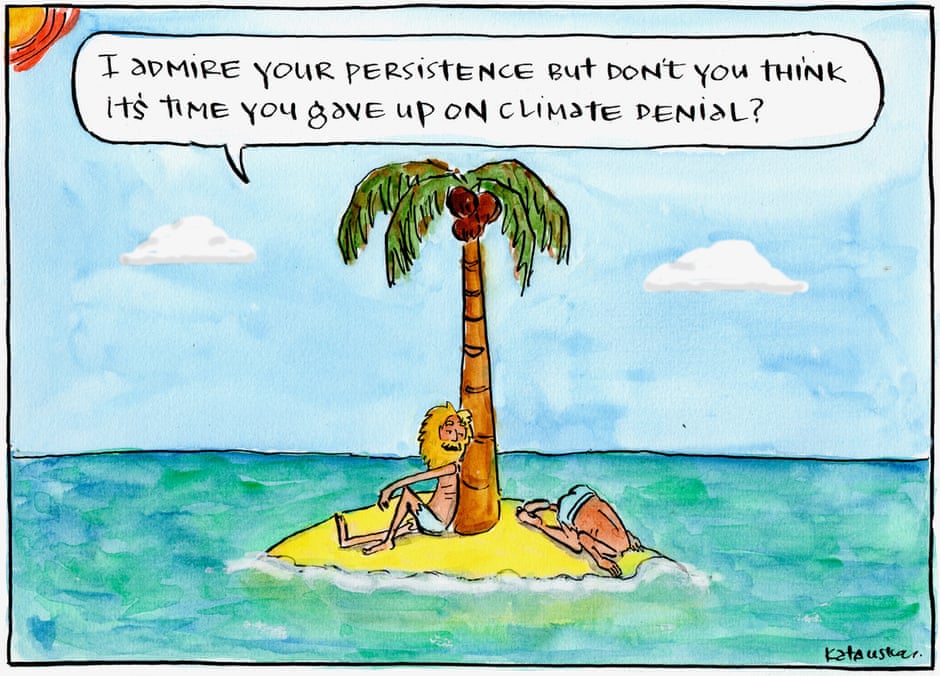
Illustration: Fiona Katauskas/The Guardian
Tags: #cartoon #climate #climate_change #climate_crisis #climate_scepticism #climate_denial
The Guardian
As climate policy is weakened, extreme weather intensifies and more refugees are driven from their homes – and the cycle of hatred continues.
Round the cycle turns. As millions are driven from their homes by climate disasters, the extreme right exploits their misery to extend its reach. As the extreme right gains power, climate programmes are shut down, heating accelerates and more people are driven from their homes. If we don’t break this cycle soon, it will become the dominant story of our times. (...)
(Text continues underneath the illustration.)
If governments limited heating to their agreed goal of 1.5C, the numbers [of people] exposed to extreme heat would be reduced fivefold. But if they abandon their climate policies, this would lead to around 4.4C of heating. In this case, by the end of the century around 5.3 billion people would face conditions that ranged from dangerous to impossible. (...)
Culture war entrepreneurs, often funded by billionaires and commercial enterprises, cast even the most innocent attempts to reduce our impacts as a conspiracy to curtail our freedoms. (...)
You cannot propose even the mildest change without a hundred professionally outraged influencers leaping up to announce: “They’re coming for your ...” It’s becoming ever harder, by design, to discuss crucial issues such as SUVs, meat-eating and aviation calmly and rationally.
Climate science denial, which had almost vanished a few years ago, has now returned with a vengeance. Environmental scientists and campaigners are bombarded with claims that they are stooges, shills, communists, murderers and paedophiles. (...)
As the impacts of our consumption kick in thousands of miles away, and people come to our borders desperate for refuge from a crisis they played almost no role in causing – a crisis that might involve real floods and real droughts – the same political forces announce, without a trace of irony, that we are being “flooded” or “sucked dry” by refugees, and millions rally to their call to seal our borders. (...)
[L]egislators in Texas are waging war on renewable energy, while a proposed law in Ohio lists climate policies as a “controversial belief or policy” in which universities are forbidden to “inculcate” their students. (...)
Already, at Europe’s borders, displaced people are pushed back into the sea. They are imprisoned, assaulted and used as scapegoats by the far right, which widens its appeal by blaming them for the ills that in reality are caused by austerity, inequality and the rising power of money in politics. European nations pay governments beyond their borders to stop the refugees who might be heading their way. In Libya, Turkey, Sudan and elsewhere, displaced people are kidnapped, enslaved, tortured, raped and murdered. Walls rise and desperate people are repelled with ever greater violence and impunity. (...)
Already, the manufactured hatred of refugees has helped the far right to gain or share power in Italy, Sweden and Hungary, and has greatly enhanced its prospects in Spain, Austria, France and even Germany. In every case, we can expect success by this faction to be followed by the curtailment of climate policies, with the result that more people will have no choice but to seek refuge in the diminishing zones in which the human climate niche remains open. (...)
The two tasks – preventing Earth systems collapse and preventing the rise of the far right – are not divisible. We have no choice but to fight both forces at once.
Tags: #climate #climate_change #climate_crisis #global_warming #extreme_weather #refugees #climate_refugees #pushbacks #border_wall #floods #droughts #far_right #hard-right #climate_denial #consumption #overconsumption
Media Lens
(...) Recall the context in which news and commentary appear: the tsunami of 24/7 corporate advertising that is subject to no discussion whatever regarding its bias. Unless we accept that these adverts should be balanced by a counter-tsunami of anti-corporate advertising, there is no question of media impartiality for this reason alone.
But this is still just scratching the surface. In our corporate society, the greatest triumph of the corporate monoculture is not the filtered content of the daily newspaper or nightly newscast; it is us, our conception of who we are, of what it means to be human. We may mock the Sun and lament the Mail, but look in the mirror – we are the ultimate product of propaganda. (...)
(Text continues underneath the image.)
.
if millions of corporate men and women fundamentally perceive themselves as products to be sold on the job market, the question of non-conformity, of challenging corporate society, does not even arise. (...)
When Fromm says ‘nothing is too serious’, he means that we are fundamentally indifferent.
Can we point to evidence? Last week, it was reported that the highest April temperature ever recorded in Spain – the kind of record that might, historically, have been broken by a fraction of a degree – had been blown away by a rise of 5C.
This latest sign of impending climate catastrophe was reported briefly and then forgotten. It received a tiny fraction of the merited attention and concern – not just from the press but also from the public. It was just one more example of how ‘modern man exhibits an amazing lack of realism for all that matters. For the meaning of life and death, for happiness and suffering, for feeling and serious thought’. (Fromm, p.166) (...)
We learn a lot when the likes of Chorley encounter Chomsky and other dissidents whose souls are not for sale; not because the Chorleys have much to say, but because we are witness, not just to a clash of ideas and values, but of ways of being. It is a clash between sincerity and fakery, clarity and obfuscation, engagement and indifference, compassion and egotism. (...)
‘We’re racing towards a precipice of environmental destruction. We’ve got a couple of decades in which we could mitigate or control it, but we’re racing in the opposite direction – nothing could be more dangerous than that. That means reaching irreversible tipping points, at which stage, just steady decline to the destruction of human life on Earth. We’ve never faced that before. Actually, we’ve been facing it in a way since August 6th, 1945, but never at this level of danger.’
Typically for this kind of disengaged journalism, Chorley responded to this awful assertion as if he hadn’t truly heard what had been said, responding: ‘It’s interesting that; I was going to ask you…’. ‘It’s interesting’ was not a serious response to the gravity of what Chomsky had said. Chorley blandly recognised that politicians didn’t seem very interested in responding to the climate crisis. As for the rest of us, he said, ‘we spend our time talking about trivial things’. (...)
Chomsky mentioned some non-trivial crises that are discussed: the Ukraine war, the Yemen war, ‘the total destruction of Iraq, going on still; these are all very serious issues’.
He noted, further, that, last year, fossil fuel production had increased. (...)
Chorley then raised the issue of Ukraine:
‘Certainly, in the UK, the left – actually under people like Jeremy Corbyn – argued that it wasn’t Russia that was the enemy, it was the US that was destabilising the world. (...)
Chomsky responded:
‘Well, the invasion of Ukraine is plainly a war crime. You can’t put it in the same category as greater war crimes, but it’s a major one.’
Which crimes did Chomsky have in mind? He noted that the UN and Pentagon estimate that about 8,000 civilians have been killed in Ukraine:
‘That’s a lot of people, what the United States and Britain do overnight.’
Of course, the 8,000 figure is ‘presumably an underestimate’, Chomsky added, before offering a series of thought experiments:
‘Let’s say it’s twice as much – that would put it at the level of the [1982] US-backed, Israeli invasion of Lebanon, which killed about 20,000 people. Let’s say it’s off by a factor of ten… that would put it in the category of Reagan’s terrorist atrocities in El Salvador, roughly on the order of 80,000. Of course, Iraq is just another dimension.
‘So, it’s serious, a terrible crime. But you can understand why the Global South does not take very seriously the eloquent protestations of Western countries about this “unique episode in history”. They’ve been victims of far more. (...)
These, indeed, are simply facts – the approximate death tolls are well-known, highly credible. The killers are known. There is no ideological bias in these observations. There is ideological bias in the notion that these facts are somehow ‘leftist’. (...)
Chorley again fell back on the ‘equivalence’ theme:
‘But you’re then drawing comparisons between Nato and China and Russia; you see an equivalence between…’
Again, Chomsky rejected the claim:
‘No, I don’t; Nato is a much more aggressive alliance. Nato has invaded Yugoslavia, invaded Libya, invaded Ukraine – backed up the invasion of Ukraine – backed up the invasion of Afghanistan. It’s an aggressive military alliance. Everybody outside the West can see it. In the West, we’re not allowed to think it because we’re deeply controlled by adherence to the party line. But everybody else can see it.’ (...)
In a final, remarkable question indicating just how disengaged and indifferent he had been throughout the interview, Chorley asked:
‘Finally, then, let’s round this off; let’s try and be a bit more optimistic… Will the next century be better than the last?’
Again, it was as if Chorley hadn’t heard what Chomsky had said. Heroically, Chomsky retained his patience for a few seconds longer:
‘There won’t be organised human life a century from now, unless we reverse the course the leadership is now taking towards racing over the precipice on climate destruction.’
By way of a final little joke, Chomsky added:
‘You read the latest IPCC report, I’m sure.’
Tags: #media #news_media #censorship #propaganda #coporate_media #bbc #the_guardian #advertising #fromm #erich_fromm #new_statesman #Mehdi_Hasan #jonathan_freedland #times_radio #noam_chomsky #chomsky #murdoch #rupert_murdoch #chorley #climate #climate_change #climate_crisis #climate_destruction #global_warming #ipcc #extinction
The Guardian
Were we able to perceive afresh the sheer scale of fossil fuel impact we might be horrified, but because this is an old problem too many don’t see it as a problem.
(Text continues underneath the photo.)
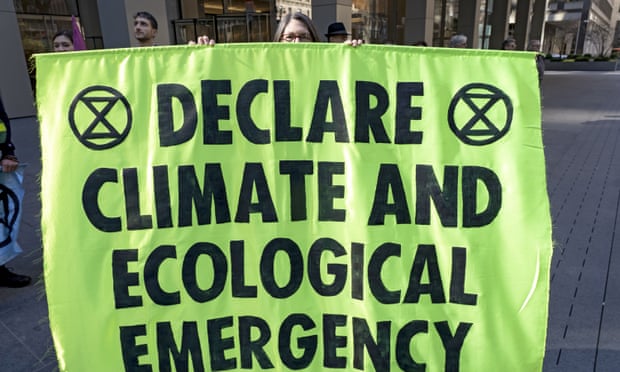
A climate activist holds banner in front of the NYC office of JPMorgan Chase bank's new headquarters during an ‘Occupy Park Avenue’ protest on 29 October 2022 in New York City. Photograph: Ron Adar/Rex/Shutterstock.
If fossil fuel use and impact had suddenly appeared overnight, their catastrophic poisonousness and destructiveness would be obvious. But they have so incrementally become part of everyday life nearly everywhere on Earth that those impacts are largely accepted or ignored (that they’ve also corroded our politics helps this lack of alarm). This has real consequences for the climate crisis. Were we able to perceive afresh the sheer scale of fossil fuel impact we might be horrified. But because this is an old problem too many don’t see it as a problem. (...)
[L]ong-term phenomena become acceptable merely because of our capacity to adjust. Violence against women (the leading form of violence worldwide) and slower forms of environmental destruction have been going on so long that they’re easy to overlook and hard to get people to regard as a crisis. (...)
To normalize is to turn something into the status quo, into something no longer seen as a problem, and this in turn undermines the impetus to pursue a solution. (...)
The fossil fuel industry through airborne particulate matter alone annually kills far more people every year than Covid-19 has in three years. Recent studies conclude that nearly 9 million people a year die from inhaling these particulates produced by burning fossil fuel. It’s only one of the many ways fossil fuel is deadly, from black lung among coal miners and cancer and respiratory problems among those near refineries to fatalities from climate-driven catastrophes such as wildfire, extreme heat and floods. (...)
One consequence of these habits of mind is the hostile reaction to the impact of renewables. Renewables require mining; the total amount of mining they require is far less than the fossil-fuel mining that goes on all around us and has for a long time. (...)
With renewables the materials need to be extracted once and then are used for many years and are thereafter, in many cases, recyclable; with fossil fuel we burn it up as we go, so constant new interjections of coal, oil or gas are needed. They literally go up in smoke. (...)
“Avoiding climate breakdown will require cathedral thinking. We must lay the foundation while we may not know exactly how to build the ceiling.” (...)
Astroturf organizations backed by conservatives and fossil-fuel interests have pushed false claims about health threats and organized locals against both wind turbines and solar installations. But the space they take up can be far less than that occupied by fossil fuel, and many turbines and solar panels coexist with agriculture. (...)
The way we have long operated was always destructive, and it’s now a crisis larger than any in human history. Change needs to come, swiftly, and though practical change is crucial, so are changes in imagination, perception and values. The two go together, and they always have.
Tags: #fossil_fuel #oil #gas #exxonmobil #suncor #tar_sands #pollution #air_pollution #health #climate #climate_change #climate_crisis #renewables #energy #energy_transition
The Guardian
Investigation into Verra carbon standard finds most are ‘phantom credits’ and may worsen global heating.
The forest carbon offsets approved by the world’s leading provider and used by Disney, Shell, Gucci and other big corporations are largely worthless and could make global heating worse, according to a new investigation. (...)
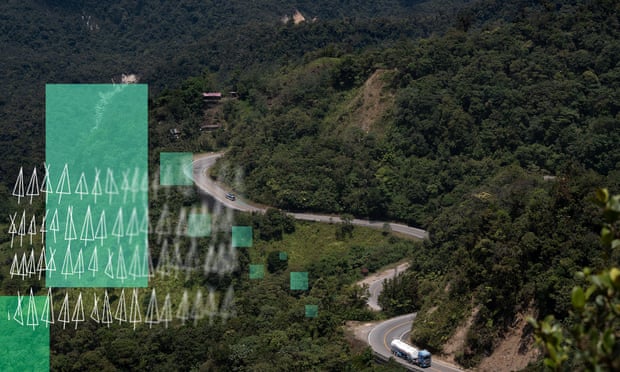
The Alto Mayo protection forest in Moyobamba, Peru, was supposed to be a flagship offsetting project but has faced human rights issues. Composite: Guardian Design/AFP/Getty Images.
Tags: #climate #climate_change #climate_crisis #co2 #carbon #carbon_offset #verra #dinsey #shell #gucci #rainforest #deforestation #fossil_fuel #global_warming #exhaust #pollution #moyobamba #peru #carbon_credit #phantom_credit #global_heating #forest_carbon_offset
Jonathan Cook (Middle East Eye)
A lack of public concern in the West at dealing with the impending climate catastrophe isn’t accidental. It’s been engineered.
COP27, the United Nations’ annual climate conference attended by world leaders, kicked off in Egypt at the weekend in the midst of a wave of civil disobedience actions in the UK.
The protests have been led by environmental groups such as Just Stop Oil and Extinction Rebellion, and come as oil giants have announced massive profits from surging energy prices caused by the Ukraine war, and new reports show catastrophic climate change is soon to reach a tipping point, becoming irreversible. (...)
(Text continues below the photo.)
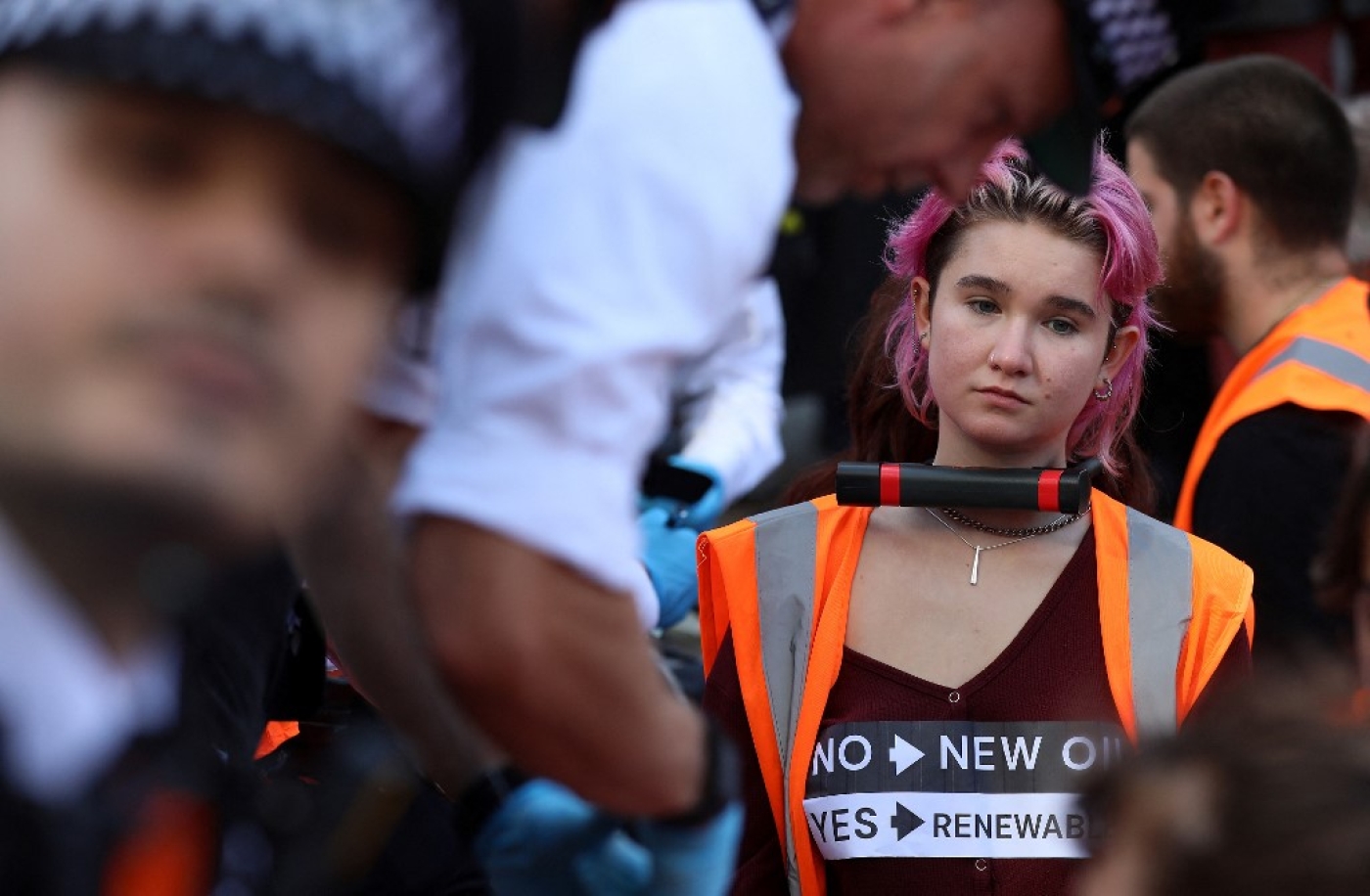
Protesters, with their necks padlocked together, block the road as they take part in a protest by Just Stop Oil climate activists at Piccadilly Circus, London, on 9 October 2022 (AFP)
Most of these actions have been ignored by the media or dismissed as the antisocial posturings of individuals divorced from the concerns of ordinary people. (...)
But the criticism most widely hurled at these various forms of direct action is that they are counterproductive, that they antagonise ordinary people and make them stop listening.
There is an obvious rejoinder. No one appeared to be listening before the activists took to the streets. Endless scientific warnings have made little impact on public discourse. The establishment media have paid only lip service to the dangers, even as the effects on the climate have become harder to overlook. And governments have made placatory noises while doing nothing meaningful to reverse the collision course humanity is on with the planet. (...)
The World Meteorological Organization, meanwhile, noted that the three greenhouse gases have reached record highs, with methane – the biggest offender – showing the largest year-on-year jump.
Civil disobedience is a symptom not of the climate crisis – nature won’t listen to the protesters – but of the inaction that continues to be the default position of governing political elites, as well as the billionaire-owned media that is supposed to serve as a watchdog on their power. (...)
The establishment media is playing a crucial part in twisting social and political priorities. Every time it focuses on the inconvenience caused by the climate protests – or the potential risk of someone dying in an ambulance caught in a hold-up – it is downplaying what are already the tangible, lethal consequences of the climate emergency. (...)
Nonetheless, the claim that there is widespread antipathy in Britain towards acts of civil disobedience on the climate is greatly overstated – and by the very same media outlets determined to play down the climate crisis. (...)
Despite this, the rightwing Conservative government in London has been progressively eradicating the right of protest – precisely to prevent actions to highlight its continuing crimes against the planet.
A spate of recent legislation has been designed to criminalise any expression of dissent. (...)
Actions like glueing oneself to railings, sitting in a road, obstructing fracking machinery or tunnelling can result in up to three years’ imprisonment. “Disruption prevent orders” can be issued to anyone who has attended a protest in the last five years, banning them from taking part in future demonstrations for two years. Activists’ freedom of movement can be limited by orders requiring them to wear an electronic tag or denying them entry to specified areas. (...)
One might have hoped that at least Britain’s opposition party would be vowing to reverse such draconian measures once in office. But Labour leader Keir Starmer has suggested he would legislate even stiffer penalties for those taking direct action on the climate. (...)
What all this represents is a shift over the past decade from one kind of political insanity – a denial, either implicitly or explicitly, of a climate crisis – to a different kind of insanity: official acknowledgment of a looming climate catastrophe but a refusal to do something meaningful to avert it. (...)
But even more troubling, wars seem to be increasingly useful as a distraction. (...)
In this way, wars helpfully deflect attention from the far bigger global crisis of the environment, one in which Western leaders cannot present themselves as the Good Guys – because they are, in fact, the worst, the greediest and the most destructive of the Bad Guys.
The endless War on Terror has served this purpose all too well over the past two decades, when the climate crisis should have been the world’s top priority. (...)
Instead the constant chatter in western capitals, on TV and in the press, is about how to find new ways to generate gas and oil for public consumption to overcome the energy crisis, not how to wean ourselves off these climate-destroying fuels. (...)
But in a world of self-inflicted collapse, Putin is no more insane than his western counterparts. In truth, the only sane people are those trying to wake up everyone else, whether by glueing their hands to the road, climbing bridges or hurling soup at paintings.
> See also: Why There Is No Public Sense Of A Climate Crisis (Media Lens)
Tags: #climate #climate_change #climate_crisis #global_warming #sea_level #ocean_level #water_security #drought #desertification #paris_agreement #cop26 #cop27 #government #international_cooperation #pollution #water #water_quality #supreme_court #lobby #rupert_murdoch #media #journalism #journalist #corporate_media #state #public_opinion #heat_wave #extreme_weather #food_shortages #deforestation #bush_fires #propaganda #public_order_bill #police_bill #disruption_prevent_orders #conservatives #labour #keir_starmer #starmer #sunak #rishi_sunak #energy #energy_transition #fossil_fuel #gas #oil #extinction_rebellion #just_stop_oil